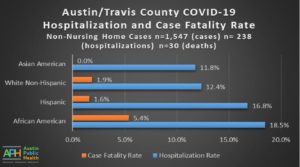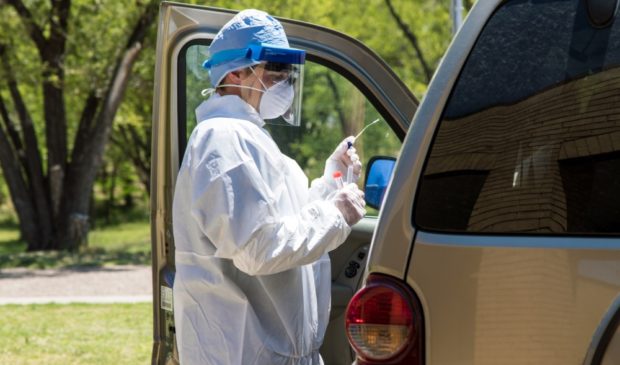Austin Public Health to address health inequity in response to Covid-19
Wednesday, June 3, 2020 by
Ryan Thornton Austin Public Health Director Stephanie Hayden told City Council Tuesday that the city needs to address the vast inequities and social determinants of health – things like jobs, housing and health services – that have concentrated Covid-19’s impact upon poor communities of color.
“Covid-19 doesn’t discriminate in terms of who it infects; it’s going to infect people of all colors,” said Dr. Mark Escott, interim medical director of Austin-Travis County. “Where it does discriminate is in our communities of color. It discriminates based on poverty.”
Hayden said the handful of ZIP codes in Northeast and Southeast Austin that have the most positive cases are the same areas that suffer disparities such as poverty and barriers to health care. The department is currently directing much of its health resources and testing opportunities into those communities, but Escott said in order for those programs to work, the city must deal with the broader causes of health inequity.
“If we only focus on testing for Covid-19 and isolating for Covid-19, we’re not going to save more people.” Escott said. “We’re going to save more people if we get to the heart of the matter, and that is providing people with the resources they need to feed themselves nutritious meals, to have access to health care, to have access to shelter, and the other things that are going to determine their health status.”
These are the kinds of factors Escott said have led to “very, very concerning” trends in the data on rates of infections, hospitalizations, and fatalities that has emerged during the pandemic.

.
Recent data suggests that infections in both the African American and Hispanic communities are far more likely to result in hospitalization and that infections among African Americans have led to death in over 5 percent of cases – well above the overall non-nursing home average fatality rate of 1.7 percent. Infections among Hispanic residents account for around 70 percent of recent hospitalizations, although Hispanic residents make up under 34 percent of the Travis County population.
To reverse those trends, Escott said the city needs to act now. For a start, he proposed screening for underlying conditions like high blood pressure and diabetes while testing for coronavirus in poor communities of color and in individuals over 65. Both conditions, he explained, can lead to complications with Covid-19, but are easy and inexpensive to diagnose and treat.
Beyond the moral imperative to correct health inequities, Escott said investing in disease prevention would save health costs in the long term and help contain the ongoing spread of the virus.
“The data shows us, if we have creative policies which can effectively address those two groups, the risk for the rest of the community is much, much smaller than we once thought,” he said. “If we want to keep the economy open and open it further, the trade-off has to be we have to make investments where we’ve failed to make investments in the past, and that’s in those communities at risk.”
The department is creating a draft plan to address health inequities and will host a forum on June 13 to discuss ways to improve the city’s response to the pandemic.
“I encourage you to proceed with new programs, to bring back to us as a Council if you need additional funding for programs, or if you just need additional authority, because I think this is really critical,” Council Member Ann Kitchen told the department Tuesday. “And this is an example of how we can come out of the other side of this Covid crisis in a way that we are more resilient and better off.”
Alluding to the unprecedented local and national plea for racial justice over the past week, Council Member Natasha Harper-Madison thanked Escott for emphasizing the root causes of these disparities.
“That’s exactly what we’re talking about here,” she said. “When we’re talking about systemic change, we’re talking about all the systems; it’s not just one system, because all the systems feed one another.”
The Austin Monitor’s work is made possible by donations from the community. Though our reporting covers donors from time to time, we are careful to keep business and editorial efforts separate while maintaining transparency. A complete list of donors is available here, and our code of ethics is explained here.
You're a community leader
And we’re honored you look to us for serious, in-depth news. You know a strong community needs local and dedicated watchdog reporting. We’re here for you and that won’t change. Now will you take the powerful next step and support our nonprofit news organization?












